Welcome to Long Live the ABB: Conversation from the Crossroads of Southern Music, History, and Culture. I appreciate you for being here.
A few weeks ago, Jason Isbell completed his annual run at my hometown venue: the Ryman Auditorium in Nashville, the Mother Church of Country Music. I caught two shows live and one via livestream.
It gave me a chance to reflect on my own journey the past few years, and how current artists like Isbell reflect the intersections of Southern music, history, and culture.
The Ryman run and the anniversary got me thinking about how important Jason Isbell and his music has been to me over the past several years.
Influences
October 18 marked one year since publication of Play All Night! Duane Allman and the Journey to Fillmore East.1
My journey since publication has been in sharing the lessons I learned from studying Duane Allman and his artistic masterpiece At Fillmore East. And one of them is acknowledging your influences.
Jason Isbell is one of mine, not just as a musician and a writer, but also as a fellow Southerner and, frankly, a human being.
He’s also one of my favorite purveyors of the Unending Conversation2—as in this recent interview with John Dickerson. (Seriously y’all, it’s well worth the watch.)
A writer’s journey
Play All Night began as a Ph.D. dissertation, “You Wanna Play in My Band, You Better Come to Pick: Duane Allman and American Music.”3
I’d been researching Duane for years and it took a lot of energy to work my way through the MASSIVE collection of primary sources I’d gathered.
It was a frustrating slog at times; I almost quit altogether once.
I didn’t have writer’s block.4 I could still write. I wasn’t enjoying the work I was creating. I quoted Isbell at the time: “You just aren’t having any fun anymore.”
I worked my way through that moment, and several others, submitting my dissertation in August 2018.
That’s when I first began the arduous process of turning that 500+ page, 144,000 word tome into Play All Night, a 250 page, 85,000 manuscript focused on Duane Allman’s musical manifesto: At Fillmore East.
Thank God for the TVA
I signed the contract for Play All Night just about the time the pandemic started. I did the bulk of my writing at my home outside of Nashville, and completed the final manuscript in three bursts, all in places where Duane’s story happened:
February 2021, Macon. Draft 1 submitted to University Press of Florida.
October 2021, NYC. Revision 1 addressing UPF reviews.
October 2021, Muscle Shoals. FINAL draft.5
It was in Muscle Shoals, where it all began for Duane, that I began to process my own connections to the South and my southern-ness. Once again, the Unending Conversation inspired me.
Shoals natives Jason Isbell and the Drive-By Truckers (where Isbell first made his name) provided the soundtrack. Stephen Deusner’s Where the Devil Don't Stay: Traveling the South with the Drive-By Truckers6 provided the context.
I won’t go into all of the history here, but it’s deep, and it connects directly to the Allman Brothers Band story. (Among other things, co-founder Patterson Hood’s dad David played bass on nearly every major song recorded in Muscle Shoals.)
By all measures, the Drive-By Truckers are one of the most important southern bands of my generation. What has always resonated with me is how well their songs capture what I see in the South and and southerners (and all that entails).
Their music reflects my own southern upbringing, the good, the bad, and the ugly.
For me, history is more than just a career or lifelong passion. History provides focus to the world I inhabit, its study (formally and informally) has changed how I view the world. I see this as a good thing.
I’m a southerner, a historian who’s been trying to better understand the South for myself since, well, forever. Fortunately for me, so have Jason Isbell, Patterson Hood, and Mike Cooley (the third of the great DBT songwriters).
All three weave Southern history, myth, and folklore into their songs, many of which are set in and around Muscle Shoals. Isbell’s “TVA” is one example (it’s the actual song that sent me on the DBT/Isbell tip two years ago this past October).
I queued up “TVA” when I took the photos above. I thought about fishing with my dad at the lake at the farm where he grew up7 and the stories he would share about my own family.
“I grew up two hours north of Birmingham.
Me and my daddy used to fish next to Wilson Dam.
He told some stories, Camaros and J.W. Dann.
When I got a little older I wouldn't and now daddy can't.
So I thank God for the TVA, thank God for the TVA.
When me and my daddy used to bow to the river and pray.
Thank God for the TVA.”
The song is a veritable history lesson—a family story set against the backdrop of one of the most significant events in American history—the Great Depression. “TVA” got me thinking about the significant legacy of federal investment in the American South. Muscle Shoals is part of that legacy, and Duane is a part of that legacy.
It all connects.
Jason Isbell and me
My visit to Muscle Shoals to complete Play All Night was October 2021. Two years earlier, Isbell’s Ryman were some of the best shows I attended in the Beforetimes. I left them rejuvenated and ready to take on the world.
Then came 2020…
I s’pose I don’t need to say much more than that. We all lived it.
Isbell was a constant companion.
He released Reunions in May 2020, two months into the pandemic. I’d already begun a relatively new habit: listening with intentionality to the new music of certain artists.8
I play certain new records over-and-over-and-over-and-over again, to give them time to sink in a bit. I treat a new Isbell record like I did in the 80s when I’d spend my precious dollars on a new album. Whether I liked it at first listen was never an obstacle. Not even attempting to enjoy the new sounds wasn’t even an option!
I played Reunions nonstop a few times each day for a couple of weeks. It’s burned deeply into my craw.9 The record reflects a very specific time and place in my life.
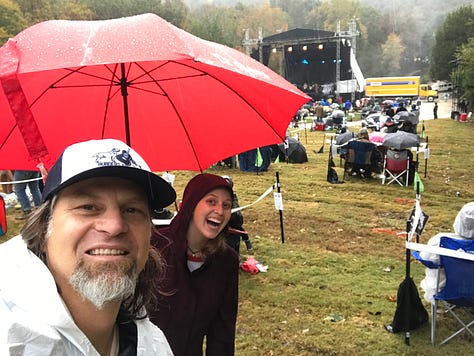
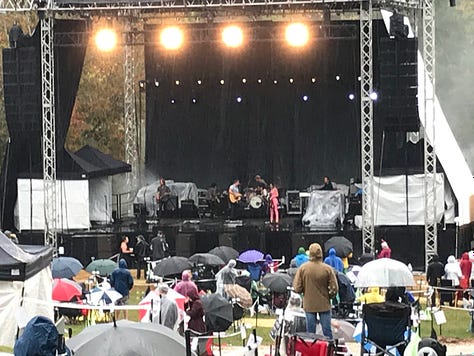
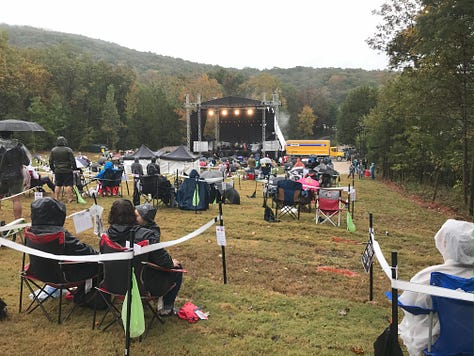
I religiously watched Jason’s wife Amanda Shires’s Isolounging livestream. I “attended” Isbell’s virtual release party and felt for him having to launch such a great record from an empty Brooklyn Bowl. And I was there for two of the four shows he played in October 2020—the first shows I attended with the “pod” concept.10 It was a weird setting, but so, so good to have live music back in our lives. (Y’all remember.)
The title of today’s post comes from Jason Isbell’s “Hope the High Road.” I remember the relief I felt as I sang the bolded words below at those October 2020 gigs:
Last year was a son of a bitch
For nearly everyone we know
But I ain't fighting with you down in a ditch
I'll meet you up here on the road
Fast-forward to 2023
Isbell’s had a busy year. In April HBO released Running with Our Eyes Closed, a documentary about the recording of Reunions. He released Weathervanes in June. And this past October he celebrated the 10th anniversary of Southeastern—a truly magnificent album he recorded shortly after getting sober.
I gave Weathervanes the same treatment I’d given Reunions: intentional listening. It hit me just right then (it was Recommendation #2 a few months back).
I relate to the stories Isbell tells and the people he sings about and this record is no exception. His songs about marriage and love and parenthood hit me in all the feels. He’s also an incredible chronicler of small town life in the South.
When I heard “King of Oklahoma,” I immediately thought of my pops, a small town, worker’s comp attorney who represented guys like the song’s protagonist—a construction worker struggling with addiction. (The disease that killed both my brother and sister.)11
“Cast Iron Skillet” references a number of southern myths and lessons I’ve embraced and also had to unlearn. (Watch the Dickerson interview for more on this.)
And he and his guitar partner Sadler Vaden let loose on several occasions, most notably “Miles” and “This Ain’t It” where, about halfway through the band settles into a very “Blue Sky”-inspired groove that’s also pretty magical live.
From the first note to the last, Weathervanes has stayed with me. There are songs I prefer, but there’s not a single track I skip.
Playlist
King of Oklahoma: A Jason Isbell Sampler from Bob Beatty/@Long Live the ABB
Those of you who’ve been around here for a bit know my standard disclaimer: this isn’t a comprehensive playlist.12 They’re my go-to songs. I did my best to keep it somewhat manageable timewise and to cover a wide swath of Jason Isbell’s output. Staying true to my “listen with intentionality” mantra, I focused mostly on the original studio recordings, with some exceptions.
Random Notes
The playlist has “Sometimes Salvation”—a Black Crowes’ cover—from Isbell’s Georgia Blue record. He also recorded “In Memory of Elizabeth Reed” for that album.
“Liz Reed” includes Peter Levin on keys. In addition to playing in Jason Isbell’s wife Amanda Shires’s band, Levin also played in Gregg Allman’s final touring band.
The 400 Unit has also covered “Whipping Post.”
Isbell is a road warrior. He averaged 80 shows a year from 2016-19 and nearly 100 the last two years. The outliers were 2021 (66) and 2020 when Isbell played only 10 (yes TEN) shows.13
Langiappes
Peter Levin just released a pretty cool album: Saturday Night, Sunday Morning. Here’s the Spotify link (couldn’t find it on YT). In addition to its three ABB covers, the roster includes Allman Brothers Marc Quiñones and Jack Pearson, Scott Sharrard of Gregg’s band, Lamar Williams Jr. (who inspired this playlist), and Amanda Shires.
Vincent Neil Emerson has a new record coming out this week The Golden Crystal Kingdom. Caught him last week and he was every bit as good as when I saw him open for the Tedeschi Trucks Band over the summer. Y’all might also dig his recent interview with
“Little Martha” (cont’d)14 Sea Level on “Hot ‘Lanta/Little Martha” from 5/3/78 at Atlanta’s Fox Theatre that first appeared on long-out-of-print cd called Alive Down South.
Wherever you are…
I hope the high road leads you home again
To a world you want to live in
These lines from the chorus of “Hope the High Road” always bring to mind this traditional Irish blessing:
May the road rise up to meet you.
May the wind be always at your back.
May the sun shine warm upon your face;
the rains fall soft upon your fields and until we meet again,
may God hold you in the palm of His hand.
Wishing each of you who reads this the very best.
May music help you find the high road home.
I hate to keep asking, but you do have a copy right? Sadly, Amazon is best—because it tells others.
I’ve addressed the Unending Conversation multiple times around here, including these two posts:
“You Wanna Play in My Band, You Better Come to Pick: Duane Allman and American Music,” completed 2018 under the direction of Tennessee State Historian Carroll Van West.
See “On Writer’s Block.”
I’m struck I did this backwards, beginning where the story ended and ending where it began.
One of the best music books I’ve read in a long time.
On Beatty Road no less.
There are more, but here are the Southern artists I’ve done this with over the past few years: Gregg Allman Southern Blood; Tedeschi Trucks Band Signs and I Am the Moon (oh my lord what an album!); Hiss Golden Messenger Quietly Blowing It and Jump for Joy.
Some songs, like “Letting You Go” and “St. Peter’s Autograph,” hit particularly hard giving my life circumstance at the time (about to launch my kids to college, and dealing with some significant grief from losing my brother).
This is at the Caverns in Pelham, Tennessee. Sharing the photo as a reminder to me (and to you) the great lengths musicians and venues went to bring live music back to us. Tag
.“Cod’Ine” by Buffy Sainte Marie is another song about the dangers of prescription drugs. Isbell also has a song about the drug: “Codeine”
I made this for my buddy Carm after he caught his first Isbell show last month.
The pandemic seems so long ago and yet almost like yesterday.
The “Little Martha” series is continued from…

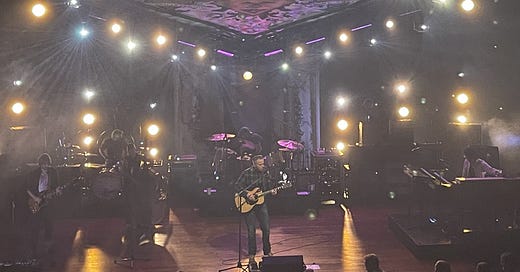


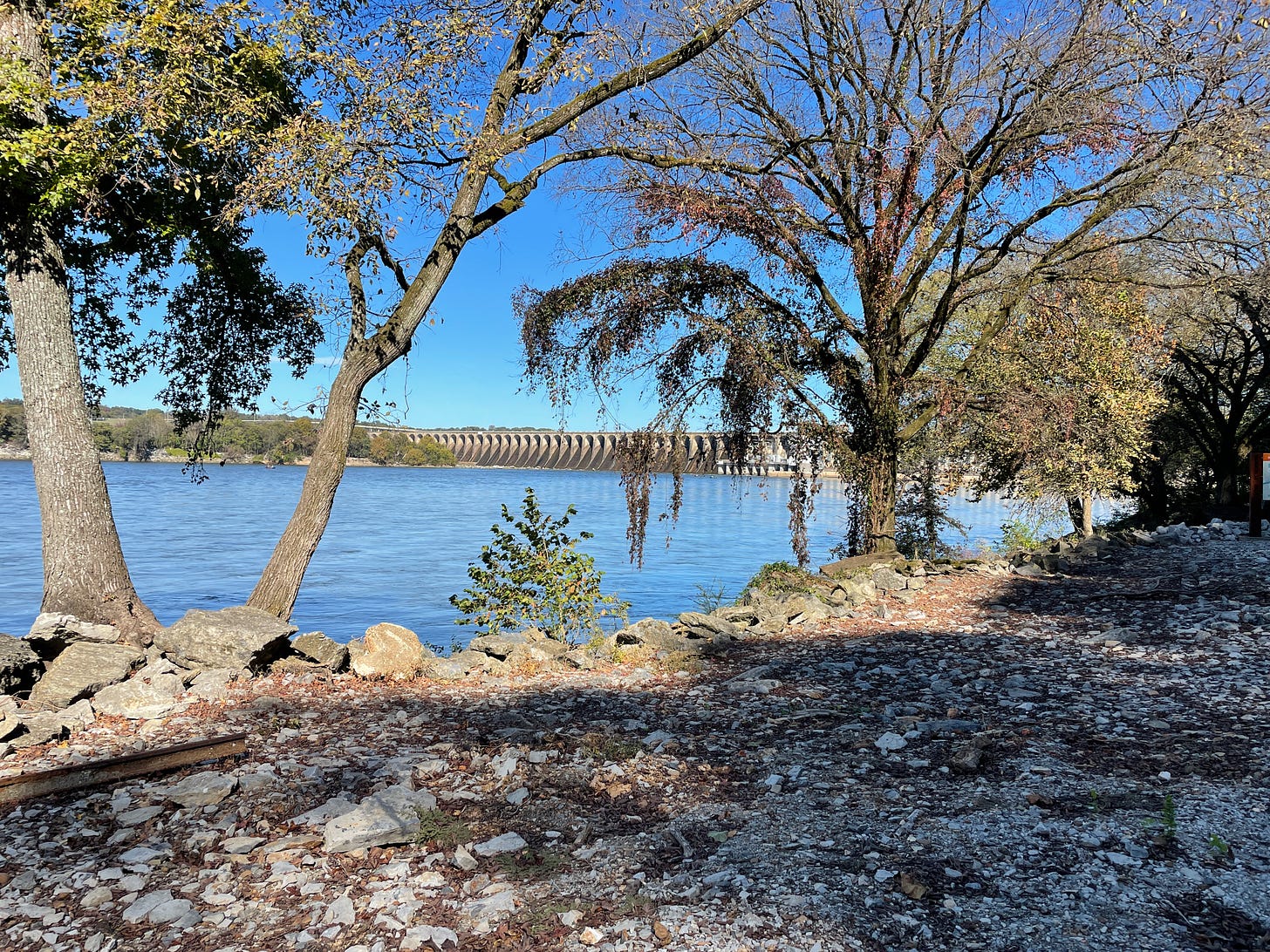

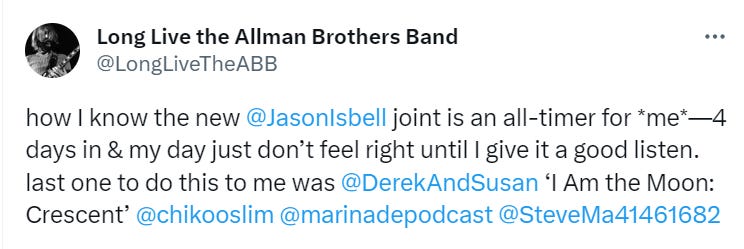
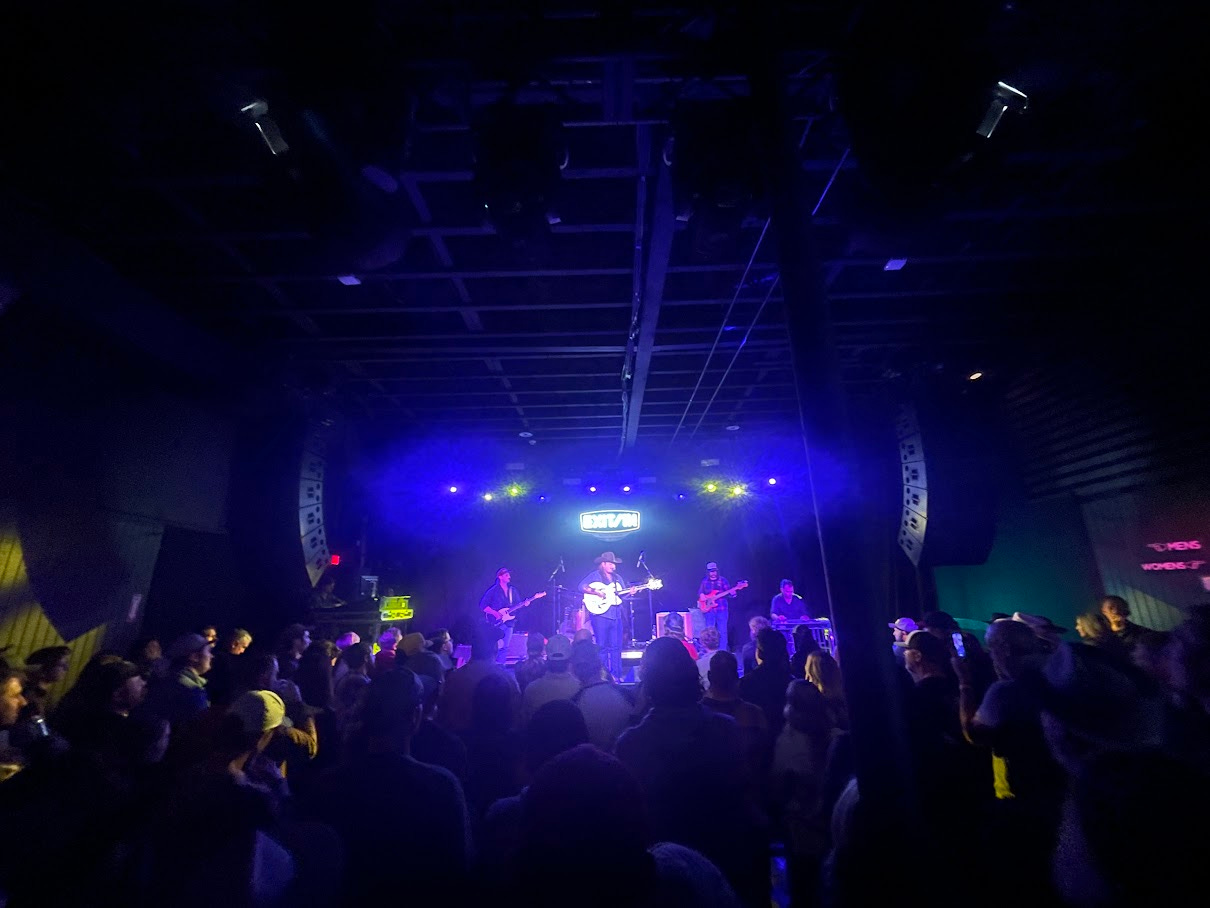

hey thanks for the shout out! :)
in re: the playlist... love the version of Alabama Pines on the Cooley/Hood/Isbell Shoals Theater album. That noodling Cooley is doing underneath is everything to me.